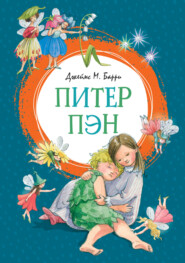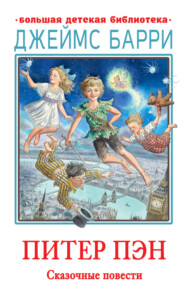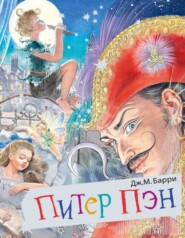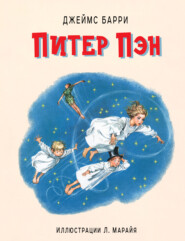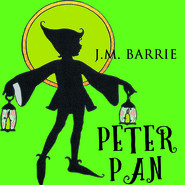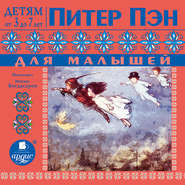По всем вопросам обращайтесь на: info@litportal.ru
(©) 2003-2024.
✖
The Little Minister
Настройки чтения
Размер шрифта
Высота строк
Поля
“Babbie,” she cried, “you didna speak about the poorhouse to Enoch?”
The Egyptian shook her head, though of the poorhouse she had been forced to speak, for Enoch, having seen the doctor going home alone, insisted on knowing why.
“But I knew,” the gypsy said, “that the Thrums people would be very unhappy until they discovered where you get the money I am to give you, and as that is a secret, I hinted to Enoch that your benefactor is Mr. Dishart.”
“You should not have said that,” interposed Gavin. “I cannot foster such a deception.”
“They will foster it without your help,” the Egyptian said. “Besides, if you choose, you can say you get the money from a friend.”
“Ay, you can say that,” Nanny entreated with such eagerness that Babbie remarked a little bitterly:
“There is no fear of Nanny’s telling any one that the friend is a gypsy girl.”
“Na, na,” agreed Nanny, again losing Babbie’s sarcasm. “I winna let on. It’s so queer to be befriended by an Egyptian.”
“It is scarcely respectable,” Babbie said.
“It’s no,” answered simple Nanny.
I suppose Nanny’s unintentional cruelty did hurt Babbie as much as Gavin thought. She winced, and her face had two expressions, the one cynical, the other pained. Her mouth curled as if to tell the minister that gratitude was nothing to her, but her eyes had to struggle to keep back a tear. Gavin was touched, and she saw it, and for a moment they were two people who understood each other.
“I, at least,” Gavin said in a low voice, “will know who is the benefactress, and think none the worse of her because she is a gypsy.”
At this Babbie smiled gratefully to him, and then both laughed, for they had heard Nanny remarking to the kettle, “But I wouldna hae been nane angry if she had telled Enoch that the minister was to take his tea here. Susy’ll no believe’t though I tell her, as tell her I will.”
To Nanny the table now presented a rich appearance, for besides the teapot there were butter and loaf-bread and cheesies: a biscuit of which only Thrums knows the secret.
“Draw in your chair, Mr. Dishart,” she said, in suppressed excitement.
“Yes,” said Babbie, “you take this chair, Mr. Dishart, and Nanny will have that one, and I can sit humbly on the stool.”
But Nanny held up her hands in horror.
“Keep us a’!” she exclaimed; “the lassie thinks her and me is to sit down wi’ the minister! We’re no to gang that length, Babbie; we’re just to stand and serve him, and syne we’ll sit down when he has risen.”
“Delightful!” said Babbie, clapping her hands. “Nanny, you kneel on that side of him, and I will kneel on this. You will hold the butter and I the biscuits.”
But Gavin, as this girl was always forgetting, was a lord of creation.
“Sit down both of you at once!” he thundered, “I command you.”
Then the two women fell into their seats; Nanny in terror, Babbie affecting it.
Chapter Fifteen.
THE MINISTER BEWITCHED – SECOND SERMON AGAINST WOMEN
To Nanny it was a dizzying experience to sit at the head of her own table, and, with assumed calmness, invite the minister not to spare the loaf-bread. Babbie’s prattle, and even Gavin’s answers, were but an indistinct noise to her, to be as little regarded, in the excitement of watching whether Mr. Dishart noticed that there was a knife for the butter, as the music of the river by a man who is catching trout. Every time Gavin’s cup went to his lips Nanny calculated (correctly) how much he had drunk, and yet, when the right moment arrived, she asked in the English voice that is fashionable at ceremonies, “if his cup was toom.”
Perhaps it was well that Nanny had these matters to engross her, for though Gavin spoke freely, he was saying nothing of lasting value, and some of his remarks to the Egyptian, if preserved for the calmer contemplation of the morrow, might have seemed frivolous to himself. Usually his observations were scrambled for, like ha’pence at a wedding, but to-day they were only for one person. Infected by the Egyptian’s high spirits, Gavin had laid aside the minister with his hat, and what was left was only a young man. He who had stamped his feet at thought of a soldier’s cloak now wanted to be reminded of it. The little minister, who used to address himself in terms of scorn every time he wasted an hour, was at present dallying with a teaspoon. He even laughed boisterously, flinging back his head, and 136 little knew that behind Nanny’s smiling face was a terrible dread, because his chair had once given way before.
Even though our thoughts are not with our company, the mention of our name is a bell to which we usually answer. Hearing hers Nanny started.
“You can tell me, Nanny,” the Egyptian had said, with an arch look at the minister. “Oh, Nanny, for shame! How can you expect to follow our conversation when you only listen to Mr. Dishart?”
“She is saying, Nanny,” Gavin broke in, almost gaily for a minister, “that she saw me recently wearing a cloak. You know I have no such thing.”
“Na,” Nanny answered artlessly, “you have just the thin brown coat wi’ the braid round it, forby the ane you have on the now.”
“You see,” Gavin said to Babbie, “I could not have a new neckcloth, not to speak of a cloak, without everybody in Thrums knowing about it. I dare say Nanny knows all about the braid, and even what it cost.”
“Three bawbees the yard at Kyowowy’s shop,” replied Nanny, promptly, “and your mother sewed it on. Sam’l Fairweather has the marrows o’t on his top coat. No that it has the same look on him.”
“Nevertheless,” Babbie persisted, “I am sure the minister has a cloak; but perhaps he is ashamed of it. No doubt it is hidden away in the garret.”
“Na, we would hae kent o’t if it was there,” said Nanny.
“But it may be in a chest, and the chest may be locked,” the Egyptian suggested.
“Ay, but the kist in the garret isna locked,” Nanny answered.
“How do you get to know all these things, Nanny?” asked Gavin, sighing.
“Your congregation tells me. Naebody would lay by news about a minister.”
“But how do they know?”
“I dinna ken. They just find out, because they’re so fond o’ you.”
“I hope they will never become so fond of me as that,” said Babbie. “Still, Nanny, the minister’s cloak is hidden somewhere.”
“Losh, what would make him hod it?” demanded the old woman. “Folk that has cloaks doesna bury them in boxes.”
At the word “bury” Gavin’s hand fell on the table, and he returned to Nanny apprehensively.
“That would depend on how the cloak was got,” said the cruel Egyptian. “If it was not his own – ”
“Lassie,” cried Nanny, “behave yoursel’.”
“Or if he found it in his possession against his will?” suggested Gavin, slyly. “He might have got it from some one who picked it up cheap.”
“From his wife, for instance,” said Babbie, whereupon Gavin suddenly became interested in the floor.
“Ay, ay, the minister was hitting at you there, Babbie,” Nanny explained, “for the way you made off wi’ the captain’s cloak. The Thrums folk wondered less at your taking it than at your no keeping it. It’s said to be michty grand.”
“It was rather like the one the minister’s wife gave him,” said Babbie.
“The minister has neither a wife nor a cloak,” retorted Nanny.






